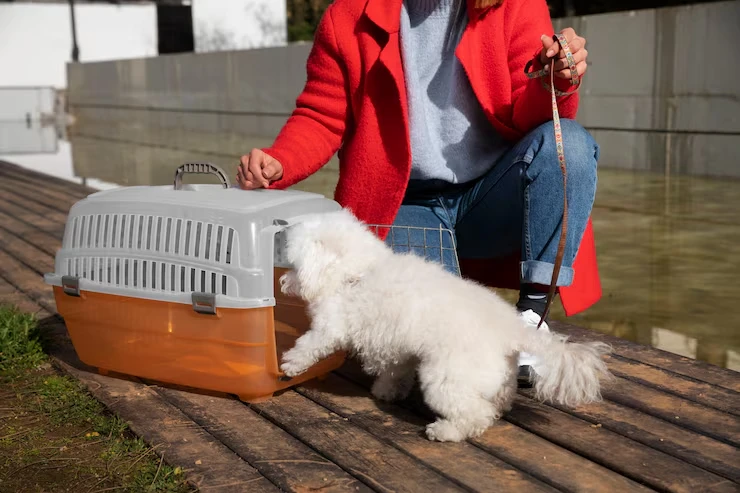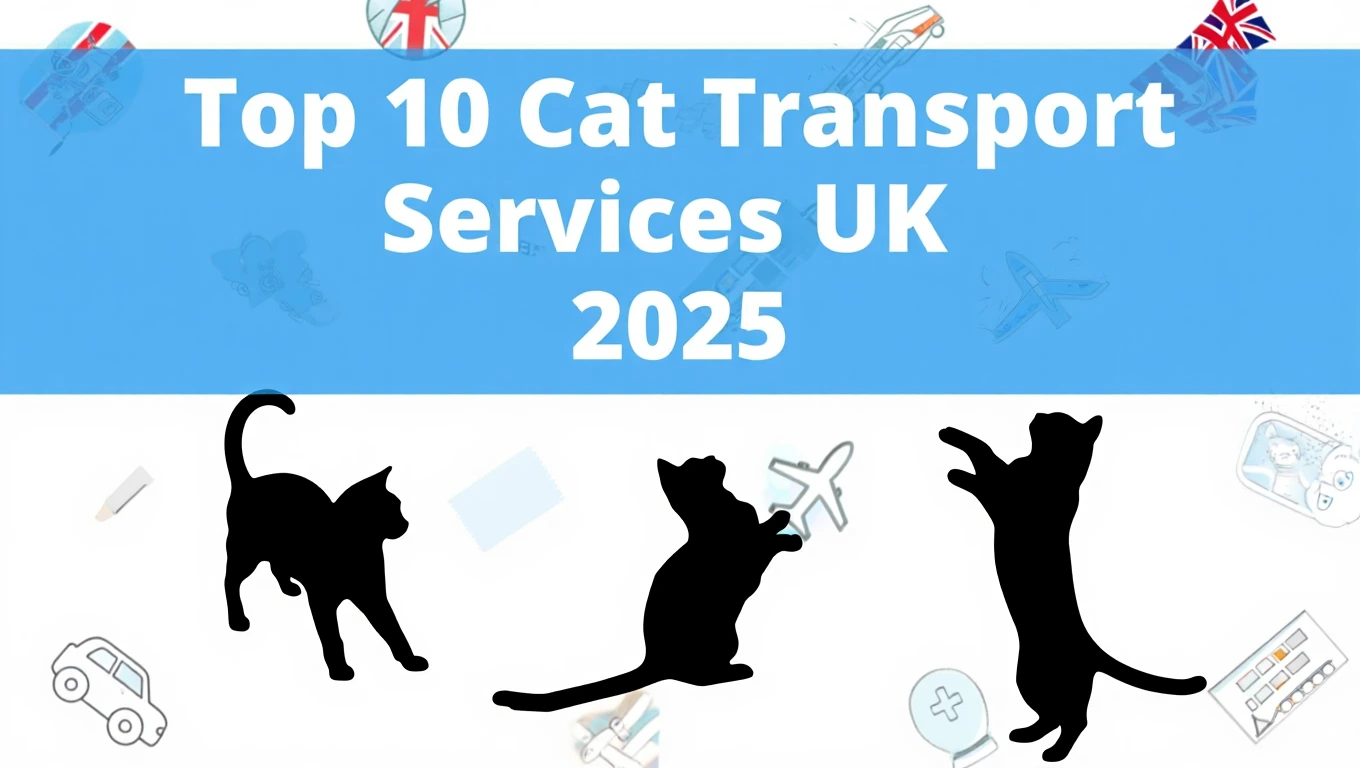International pet relocation is an increasingly significant aspect of the global pet industry, reflecting the growing trend of pet humanization and the expanding mobility of pet owners worldwide. As families move across borders for work, lifestyle changes, or travel, ensuring the safe and compliant pet relocation of their pets has become a priority. This process, however, is complex, involving intricate knowledge of international regulations, documentation requirements, and thorough planning to guarantee pet safety and adherence to laws.
The global pet travel services market, valued at USD 1.96 billion in annual growth rate of 9.69% from 2025 to 2030, driven by an increase in pet ownership, the humanization of pets, and a surge in pet-friendly travel options. This growth is mirrored in the broader pet market, which was valued at $235.32 billion in 2022 and is anticipated to reach $246.66 billion, underscoring the robust expansion of pet-related services and products.
This trend is further evidenced by the statistics showing that over 53% of global pet owners travel with their pets, and 37% of families now include their four-legged members on trips, a significant increase over the last decade. In the UK alone, 3.2 million households acquired a new pet since the pandemic began, contributing to the country’s 17 million pet-owning households. This highlights not only the deepening bond between pets and their owners but also the logistical and regulatory challenges that come with relocating pets internationally.
Navigating these challenges requires a comprehensive understanding of the specific regulations that vary from one destination to another, including quarantine measures, health certifications, and entry requirements. For pet owners moving abroad, this complexity underscores the need for meticulous planning and the potential benefits of engaging professional pet relocation services to ensure compliance and the well-being of their pets during the transition.
As pet owners increasingly view their pets as family members, the demand for pet relocation services continues to grow, reflecting the importance of these services in facilitating the global mobility of pet-owning families. With the market for pet travel services and the wider pet industry expanding rapidly, it’s clear that international pet relocation is a vital concern for a significant and growing segment of pet owners worldwide.

Understanding International Pet Relocation
International pet relocation encompasses the comprehensive process of moving pets across borders, which requires a deep understanding of various regulations and procedures. This service caters to pet owners who are relocating for work, travel, or personal reasons and wish to ensure their pets accompany them safely and legally. The process involves navigating a complex array of import/export documentation, understanding specific veterinary health requirements, and adhering to airline policies regarding pet transport.
Necessity for Specialized Knowledge
The intricacies of international pet relocation demand specialized knowledge in several areas:
Import/Export Documentation: Each country has its own set of regulations regarding the entry and exit of pets, including required health certificates, vaccination records, and sometimes even import permits.
Veterinary Procedures: Pets often need specific vaccinations, microchipping, and sometimes even quarantine periods upon arrival in the destination country. A thorough pre-travel veterinary check-up is crucial to meet all health requirements.
Airline Policies: Airlines have strict guidelines on pet travel, including the type of carriers allowed, positioning of pets during the flight (in-cabin, as checked baggage, or cargo), and documentation needed. Some airlines also have restrictions on breeds and sizes of pets that can travel.
Pros and Cons of Pet Relocation
Pros:
- Maintaining the Pet-Owner Bond: Relocating with pets helps maintain the emotional bond and support system between pets and their owners, which is especially beneficial during the stress of moving to a new country.
- Continuity of Care: Pets continue to receive care from owners who understand their needs and preferences, ensuring their well-being.
- Avoiding the Stress of Separation: Both pets and owners avoid the stress and anxiety that can come from being separated, especially over long periods
Cons:
- Expenses: The cost of international pet relocation can be significant, encompassing fees for veterinary care, documentation, and transport services.
- Stress for the Pet: Travel can be stressful for pets, involving unfamiliar environments, noises, and the possibility of temperature fluctuations, especially when flying in the cargo hold.
- Complexity and Time-Consuming Preparation: The process requires meticulous planning and understanding of regulations, which can be time-consuming and sometimes overwhelming for pet owners.
The decision to relocate pets internationally is significant and should be made with a full understanding of the requirements and potential impacts on both pets and their owners. It’s advisable for pet owners to weigh the pros and cons carefully, consider the well-being of their pets, and, if needed, seek assistance from professional pet relocation services to navigate the complexities of the process.

Preparing Your Pet for Relocation
Preparing your pet for relocation is a crucial step that requires careful planning and attention to detail. The process involves several key actions to ensure your pet’s health, safety, and comfort throughout the journey
Early Preparation and Veterinary Visits
The first step in preparing your pet for relocation is to schedule a visit to the veterinarian. This is essential for obtaining health certificates and ensuring your pet is up-to-date on necessary vaccinations, which are required for entry into most countries. Health certificates must often be issued within a specific timeframe before travel, so early preparation is critical.
- Health Certificates: These certify your pet is healthy and fit to travel, detailing vaccinations, parasite treatment, and other health checks.
- Vaccinations: Essential vaccinations typically include rabies, distemper, and others depending on the destination country’s regulations.
Microchipping
Microchipping your pet is not only a requirement for travel to many countries but also a safety measure. A microchip:
- Provides a permanent form of identification.
- Is often required for the generation of the pet’s health certificate.
- Ensures your pet can be easily identified and returned to you if lost during travel.
Acclimatizing Your Pet to Travel Crates
Getting your pet accustomed to their travel crate is another vital step in the preparation process. A travel crate should be:
- Airline-Approved: Comply with the airline’s specifications for size, ventilation, and material.
- Comfortable: Large enough for your pet to stand, turn around, and lie down comfortably.
- Familiar: Introduce the crate well in advance of your travel date, allowing your pet to spend time inside it with the door open, and gradually increase the time they spend enclosed.
To acclimatize your pet to the crate:
- Place familiar bedding and toys inside to make it a comforting space.
- Begin with short periods and gradually increase the time your pet spends in the crate.
- Use positive reinforcement, such as treats and praise, to create positive associations with the crate.
The goal is to make the crate a safe and familiar space for your pet, minimizing stress and anxiety during travel. This preparation can significantly impact your pet’s comfort and well-being during the relocation process.
Early preparation, including comprehensive veterinary checks, microchipping, and crate training, is essential for a smooth and stress-free relocation experience for you and your pet.

Navigating Regulations and Documentation
Navigating the complex landscape of international pet relocation, particularly from the UK, demands a deep dive into the specific regulations and documentation required by the destination country. This task, while daunting, is pivotal in ensuring the safety, health, and legal transport of pets across borders.
Understanding the intricacies of destination-specific rules begins with a close examination of quarantine mandates and customs procedures. Each country’s approach to managing the entry of pets can differ widely, from mandatory quarantine periods to specific vaccination protocols that must be followed to the letter. For pet owners in the UK, engaging with these regulations starts with a proactive approach to research and communication.
Reaching out directly to the consulate or embassy of your destination country stands as a critical step in this process. These official channels offer the most current and detailed information on what is required for pet importation. The dialogue with consulate officials should focus on unraveling the layers of documentation needed, understanding any quarantine processes in place, and clarifying how to navigate customs with a pet in tow. Given the dynamic nature of international regulations, these conversations are invaluable in uncovering recent updates or changes to pet travel policies.
Compiling the necessary documentation is a task that requires meticulous attention to detail. From acquiring a pet passport for travel within the EU to securing veterinary certificates that affirm your pet’s health and vaccination status, each document plays a crucial role in the travel process. Additionally, understanding the customs clearance procedure in your destination country is essential. This typically involves presenting all relevant documents upon arrival, ensuring a smooth entry process for your pet.
While the task of preparing and compiling the necessary documentation may seem overwhelming, it underscores the importance of starting the preparation process well in advance of your planned travel date. Keeping documents accessible and regularly checking for any updates to travel requirements can alleviate some of the stress associated with international pet relocation.
For those looking for additional support, Our professional pet relocation services offer expertise in navigating the legal and logistical complexities of moving pets internationally. Our knowledge of both UK-based and global regulations can be a valuable asset in ensuring a seamless transition for pets and their owners alike.
Embarking on international pet relocation is undeniably a complex process, fraught with legal, health, and logistical challenges. Yet, with thorough preparation and a clear understanding of the required steps, pet owners can navigate these hurdles successfully, ensuring their furry companions arrive safely and legally at their new homes abroad.
Choosing the Right Pet Transportation Service
Selecting the right pet transportation service for international relocation involves careful consideration of several factors to ensure the safety, comfort, and legal compliance of your pet’s journey. A reputable service can significantly ease the stress and complexity of moving your pet across borders.
Look for IPATA Membership
The International Pet and Animal Transportation Association (IPATA) is a key indicator of a reputable pet relocation service. Membership in IPATA signifies that the company adheres to high standards of care and ethics in pet transportation. IPATA members are knowledgeable about the latest regulations and best practices in international pet shipping, making them a trustworthy choice for pet relocation.
Assess the Company’s Experience and Customer Reviews
Experience is critical in the pet relocation industry. A company with a long track record of successfully moving pets internationally is likely to have a deep understanding of the various regulations and logistical challenges involved. Assessing customer reviews and testimonials can provide insights into the company’s reliability, customer service quality, and the overall satisfaction of previous clients. These reviews can be found on the company’s website, social media pages, or independent review sites.
DIY vs. Professional Services: A Comparison
Deciding between managing the pet relocation process yourself or hiring professionals involves weighing the trade-offs between cost, time, and stress.
Cost: While doing it yourself might seem like a cost-saving option, unexpected expenses can arise, including veterinary fees, crate purchases, and potential fines for non-compliance with regulations. Professional services, while initially more expensive, offer an all-inclusive package that covers all aspects of the relocation, potentially saving money in the long run.
Time: The DIY approach requires a significant time investment in researching regulations, completing paperwork, and coordinating logistics. Professional services streamline this process, leveraging their expertise to manage the relocation efficiently.
Stress: Navigating the complexities of international pet relocation can be stressful for pet owners. Professionals alleviate this burden, handling unforeseen challenges and ensuring that the pet’s journey is as smooth as possible.
Making the Decision
Choosing between a DIY approach and hiring a professional service comes down to personal preference, budget, and the complexity of the relocation. For those with the time and inclination to manage the details, the DIY route can be a rewarding experience. However, for those seeking peace of mind and a hassle-free process, investing in a professional pet relocation service is often the preferred choice.
In summary, selecting the right pet transportation service requires careful evaluation of the company’s credentials, experience, and customer feedback. Considering the trade-offs involved in doing it yourself versus hiring professionals can help you make an informed decision that best suits your needs and those of your pet.
Cost Considerations and Budgeting Tips
When budgeting for international pet relocation, understanding the variables that can impact cost is crucial. These include the size of your pet, which determines the crate size needed for travel, thus affecting airline fees.
The destination plays a significant role as well, with longer distances and specific country regulations potentially increasing expenses. Additionally, the time of year can influence costs due to seasonal demand and weather-related airline restrictions.
To manage and possibly reduce these expenses, a comprehensive approach is advised. Begin by seeking quotes from multiple pet relocation services to ensure competitive pricing and clear understanding of included services. Planning your pet’s move during less busy travel periods can also offer savings, avoiding the premium rates often seen during holidays and summer months.
Early preparation allows for spreading out costs over time, especially for necessary veterinary care and purchasing travel crates. Considering a mix of professional services for the more complex aspects of relocation and handling simpler tasks yourself can offer a balance between convenience and cost. Lastly, researching airlines for the best pet travel rates and policies can make a significant difference in overall expenses.
Adopting a strategic approach to planning and executing your pet’s relocation, while prioritizing their safety and comfort, can help in managing costs effectively without compromising on the quality of their travel experience.
Special Considerations
In the realm of international pet relocation, certain scenarios require special consideration, such as military pet relocations and ensuring pet comfort and safety during transport.
Military Pet Relocation
For military families, relocating pets can be a frequent part of life due to deployments and station changes. Recent updates to reimbursement policies have sought to ease this burden. Specifically, changes have been introduced to allow military personnel to be reimbursed for certain pet relocation costs when moving for official orders. These updates recognize the importance of pets as part of military families and aim to support the logistical and financial aspects of moving pets internationally. While the specifics of these policies can vary, they typically cover a portion of the transportation costs associated with moving pets to new duty stations, acknowledging the unique challenges faced by military personnel.

Ensuring Pet Comfort and Safety in Travel Crates
The comfort and safety of pets during relocation are paramount. A critical factor in this is the choice and preparation of travel crates. Travel crates must be the right size, allowing the pet to stand, turn around, and lie down comfortably. They must also be well-ventilated and secure. To enhance comfort, families can acclimatize their pets to the crates well in advance of the travel date, including making the crate a positive space with familiar bedding and toys.
Door-to-door crate delivery services offer a convenient solution for obtaining the appropriate travel crate. These services can provide crates that meet airline specifications and deliver them directly to your home, giving pets ample time to become accustomed to their temporary environment before the journey. This can significantly reduce stress for both the pet and the owner, ensuring a smoother transition.
Both military pet relocations and the emphasis on travel crate comfort highlight the broader theme of making pet relocation as stress-free as possible. By addressing these specific considerations, pet owners can better prepare for the complexities of moving pets internationally, ensuring their furry family members are cared for every step of the way.
Conclusion
Navigating the complexities of international pet relocation requires a blend of meticulous planning, thorough research, and, often, the guidance of professional services. From understanding the varied regulations that govern pet travel across different countries to selecting the right pet transportation service, the journey involves numerous steps. Ensuring your pet’s comfort and safety, particularly through the correct use of travel crates, and staying informed about special considerations such as military pet relocation policies, are also crucial elements of the process.
The importance of preparing your pet for relocation cannot be overstated. Early veterinary visits, proper microchipping, and acclimatizing your pet to their travel crate play significant roles in ensuring a smooth travel experience. Moreover, choosing a reputable pet relocation service, one possibly affiliated with the International Pet and Animal Transportation Association (IPATA), and understanding the cost implications are key factors in making informed decisions for your pet’s journey.
The decision between undertaking the relocation process independently or enlisting professional assistance involves weighing the costs, time, and potential stress involved. While managing some aspects of the process yourself can offer savings, the expertise of professional services can alleviate the burden of navigating complex international regulations and logistical challenges.
For those considering international pet relocation, seeking personalized advice and support tailored to your specific circumstances can make a significant difference. Pets Lets Travel stands ready to provide this expertise, offering guidance through every step of your pet’s relocation journey. By leveraging professional support, pet owners can ensure a safer, smoother, and stress-free transition for their beloved animals.
We encourage you to contact Pets Lets Travel for comprehensive advice and support tailored to their unique pet relocation needs.





